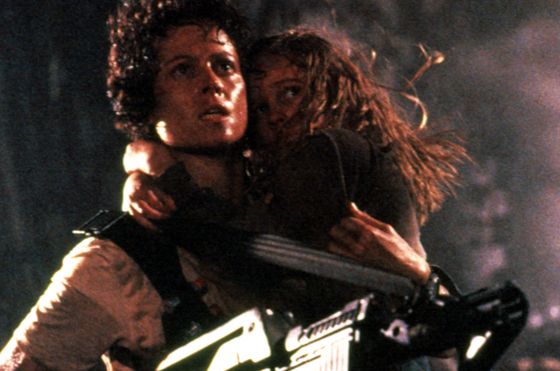
I was bantering with some friends recently about True Blood, and how this season feels different from the previous one. There is a lot more emphasis on vampire political and para-military shenanigans, and less on messy or convoluted love triangles. It’s a shift in tone that, personally, I am 100% behind, and it makes me invested in seeing what happens week to week. It has me thinking about tonal shifts in storytelling in general, when it works, and when it doesn’t. If you plan on writing more than one thing in your lifetime, you may see tones shifting in your own work, by accident or by design.
Movie sequels can see major tonal shifts. Alien was a spookhouse horror in space, while Aliens was action-packed suspense. The shift in tone works, though, because elements remained consistent and the storytelling was solid. You have a strong female protagonist, icky xenomorphs, shifty androids, and corporate douchebaggery. I hear Prometheus contains all of those elements1 but keeping some names the same between tales does not guarantee a solid shift in tone.
Consider The Matrix. It began as a very solid near-future tale of mystery and self-discovery, but the sequels suffer from their shift in tone. Instead of focusing on the characters and meaningful expansions on the world they inhabit, the second and third films let the bulk of their time become dominated by action sequences and terrible philosophy. Whenever they shift between those two elements, there’s an almost audible clunk, like a transmission that’s about to fall out of the bottom of your car. It’s damn close to painful, and it’s evidence of tonal shifts being handled badly.
Good stories aren’t just one thing all the time the entire way through. Your characters should experience a mix of emotions, bringing the audience along for the ride, and that means the tone of the story is going to change from time to time. While they might not always see it coming, the shifts should feel natural, and flow with the story and the unfolding personalities of the characters. Good examples of characters who experience these shifts well include Harry Dresden and Coburn the vampire.
You do have to be careful, though, as jarring shifts can stop your story dead. It can be very hard to balance comedy with tragedy, and messing it up is a death sentence. You can’t have Oskar Schindler suddenly break into a rendition of ‘Singing in the Rain’ in the middle of trying to rescue Jews from concentration camps. If your story’s been consistently light-hearted, interrupting a slapstick routine with the news someone has inoperable colon cancer will go over about as well as a lead balloon. While these things can work, they’re very easy to mishandle and I would advise extreme caution. Your audience is paying for the ride they’re taking with you; if they’ve felt you’ve driven them off the road into a ditch filled with brambles, they’ll be sure to let you know it.
What are some of your favorite, or least favorite, shifts in tone?
1 I still haven’t seen Prometheus yet. I may just have to suck it up and go alone to see it.



Leave a Reply